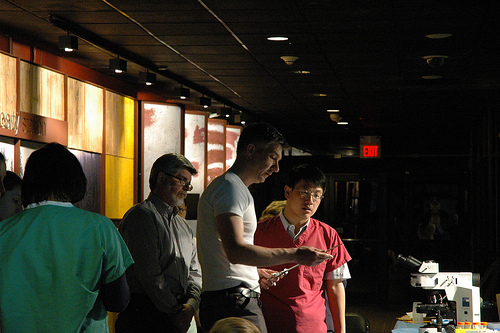Smithsonian's National Performs Artificial Insemination on Its Female Giant Panda
A Second Procedure will be Live-Tweeted Today
Giant panda breeding season began this year at the Smithsonian's National Zoo when female giant panda, Mei Xiang (may-SHONG), went into estrus over the weekend. Dr. Li Desheng from the China Conservation and Research Center for the Giant Panda in Wolong, and National Zoo scientists and veterinarians performed an artificial insemination Sunday night after they determined no competent natural breeding had occurred between Mei Xiang and male giant panda, Tian Tian (tee-YEN tee-YEN). Desheng and the National Zoo's panda team will perform another artificial insemination this evening. The National Zoo's twitter feed (@NationalZoo) will have live updates of the procedure with the hashtag #pandaAI.
While under general anesthesia, Mei Xiang was inseminated with thawed semen collected from Tian Tian in 2005. Scientists determined that the fresh semen collected from Tian Tian last night was not high enough quality to use for the artificial insemination. Zoo staff will continue to monitor Mei Xiang's hormone levels in the coming months and conduct ultrasounds to see if she is pregnant.
The Zoo received approval for its breeding plans from the China Wildlife and Conservation Association (CWCA) and the U.S. Fish and Wildlife Service, which monitors giant panda research programs in the United States. Desheng came to assist the National Zoo panda team in accordance with the Giant Panda Cooperative Research and Breeding Agreement through 2015. The Zoo's pandas have one offspring, Tai Shan (tie-SHON), born July 9, 2005. He now resides in China. For news about the National Zoo's giant pandas and special panda alerts subscribe to the Giant Panda e-newsletter.

